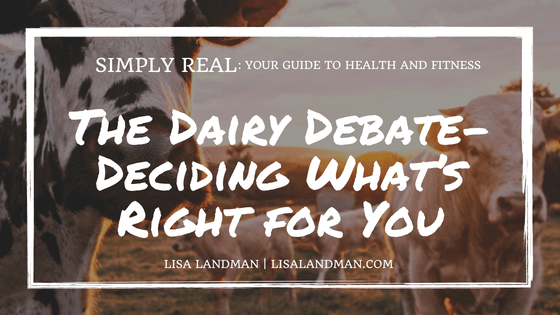The consumption of dairy has created controversy throughout the years. Many claim that dairy is healthy if it is pasteurized, low-fat and eaten in moderation. Some say that plenty of raw, full-fat dairy should be considered a health food, while others insist that the only good dairy is no dairy at all. Here is a brief summary of things to consider when deciding if dairy is right for you.
From an evolutionary viewpoint the idea of drinking the milk of another species could be questionable. Humans, like many other mammals, produce milk for a specific purpose. That purpose is to feed their own babies until the babies are ready to move on to solid foods. Similar to humans, milk from a cow is designed to make a newborn calf grow rapidly in only a few weeks, causing some to believe that it may not be ideal for human children or adults and could be contributing to the obesity epidemic in the U.S.
To address the issue of the fat content in milk the method of homogenization is used. This process of separating milk’s fatty and watery parts makes it low-fat. Many organizations, including the USDA myPyramid suggest that low fat or skim rather than full fat dairy products are better due to their lower calories and fat (especially saturated fat). However, advocates of full fat dairy claim that the butterfat is needed to properly absorb milk’s vitamins and minerals. Further, they argue that low-fat dairy can actually deplete your body’s vitamins A and D. In addition, homogenization may contribute to the accumulation of free radicals in the body by causing the enzyme xanthine oxidase to be absorbed into your bloodstream.
Besides the process of homogenization, legally, milk in the U.S. must be pasteurized. This public health measure is meant to reduce the consumers’ potential exposure to pathogens that could make them sick. Nevertheless, in addition to changing the physical structure of the milk’s proteins (thus increasing the likelihood of an allergy or sensitivity), pasteurization also destroys milk’s beneficial bacteria, vitamins, minerals and certain enzymes that help the body properly digest the milk.
Many of the proponents of drinking milk state that one of the most important benefits of milk is that it is a great source of calcium, a mineral that is essential for bone health. However, research has now demonstrated that countries with the highest milk consumption also have the highest osteoporosis rates. It is thought that better options for strong bones include dark, leafy greens, bone broths, sea vegetables, and other whole foods combined with exercise and vitamin D. Supporters of milk consumption argue that milk sold in the U.S. has been fortified with vitamin D but much of the milk that is sold in U.S. stores currently is fortified with vitamin D2, a form that the body does not utilize. Raw dairy from grass-fed cows contains naturally occurring vitamin D3, a form of vitamin D that is better utilized by the body.
Many people do fine with dairy products in their diets while others are either allergic to dairy or lactose intolerant (two very different things). People who are lactose intolerant may experience a variety of gastrointestinal symptoms when dairy is consumed. As many as 25% of Caucasians and an estimated 75-90% of Blacks, Asians, and Native Americans are lactose intolerant and will experience symptoms when eating dairy products. Some people who are sensitive to pasteurized milk can consume raw dairy products without a problem. And others are able to tolerate goat or sheep’s milk instead of cow’s milk.
The question of organic versus non-organic is not limited to just produce. Non-organic milk can contain harmful, synthetic contaminants like antibiotics, growth hormones and pesticides. Further, the cow’s feed may be genetically modified. Organic milk is free of synthetic hormones, antibiotics, and pesticides but even organic dairy contains naturally-occurring growth hormones.
Environmental concerns play a role in the debate on dairy as well. Animal agriculture is a major contributor to global warming and the pollution of our water and air. In addition, vast amounts of land, water and fuel are needed for cattle feed, grazing and processing. Many argue that the benefits outweigh the drawbacks. By researching companies, buying from small, local farms and choosing your suppliers carefully, you can help support the farms that are producing dairy products more responsibility.
Lastly we want to address animal treatment. Filthy living conditions and animal mistreatment at factory farms has been well documented. Moreover, several may also question the ethics of impregnating a cow to cause milk production then taking away her calf shortly after birth (and commonly raising it for veal) in order to maximize economic profits. Not all dairy farms participate in this unethical behavior. Several small farms treat their cows humanely and allow a more natural relationship between mother cow and calf while still being able to collect milk for human consumption.
These are a few of the issues surrounding the ongoing debate about dairy products. The choice of dairy consumption is an individual decision. Whether you choose to consume dairy or not, moderation is the key for a healthy lifestyle.
Lisa Landman is a fitness and health guru. Learn more about her professional work or check out her Twitter!

